Mike Vardy's Blog, page 59
July 3, 2017
Finding Your Best First Day of the Year

The first day of the calendar year might not be the best first day for you to start something fresh and new. It depends on a variety of factors, most notably how the rest of your calendar takes shape.
Keep in mind that January 1 isn’t the first day of the year for a lot of people around the world. The most common example would be Chinese New Year. It can fall anytime between late January and late February in a given calendar year. Dig a little deeper into the internet and you’ll find many other examples of places and cultures where January 1 is observed as just a “regular” day of the year.
Maybe you’ve got kids.Wouldn’t lining up your year to match up with their school year make more sense? It’s how I’ve started my year for some time now and it works great as my best first day of the year. Maybe the first day of school for your kids should be your first day of the year too. After all, it’s their first day of the year…right? (By the way, I’m not alone in this. Gretchen Rubin does the same thing.)
What about your birthday? Since you began life on that day wouldn’t it be wise for you to mark that day as the start of a new year for you every year? Every year on my birthday I do something that comes close to making it my best first day of the year. Perhaps your birthday – depending on what day of the year it is – makes sense as your best first day of your year.
Just because a calendar or paper planner puts January 1 at the start of the year doesn’t mean it has to be the start of your year. It’s your calendar. It’s your planner. You decide when your year starts, not those tools.
Making that decision and owning it will put you one step closer to making your year work for you…no matter what its first day is.
The post Finding Your Best First Day of the Year appeared first on Productivityist.
Positively Speaking with Dan Lerner and Alan Schlechter
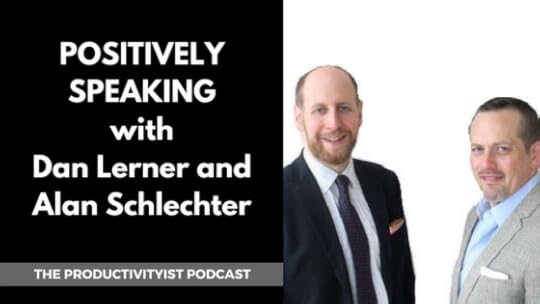
On this episode of the podcast, I am joined by Daniel Lerner and Alan Schlechter. Daniel Lerner is a clinical instructor at NYU and has a Masters in Applied Positive Psychology from the University of Pennsylvania, where he serves on the teaching staff. He works with musicians, athletes, and executives to improve their performance through developing a healthy psychological state.
Alan Schlechter, MD, is a Clinical Assistant Professor at NYU Langone Medical Center and the Director of the Child Psychiatry Clinic at Bellevue Hospital. He seeks to provide the best possible mental health care to the most vulnerable children and families in NYC.
Wherever you are right now, I think this discussion about learning will offer you some helpful advice and practical tips you can use today. Some of the takeaways from our conversation include:
Setting a good example for your kids with how you respond to situations. An airport delay can be negative or you can turn it into a chance to have a great time playing a game.
The importance of play. It comes naturally for children but as adults, we have to be told to exercise.
Following the right role models and learning. Students who studied Thomas Edison and Helen Keller were more likely to ask for help and to find a tutor.
Framing things into perspective. If you play a short game for20 minutes, winning and losing is really like a micro-second. Would you rather have a great time for 20 minutes or hate the whole game if you lose once?
The five components of happiness with the acronym PERMA. P stands for Positive emotions, E is for Engagement, the R is for Relationships, the M is for Meaning, and the A is for Achievement.
What makes up willpower? Sleep can be a very important component.
Relevant Links:
How to Succeed in College (and Life)
Science Of Happiness Professor Dr. Alan Schlechter On Getting By
Speaker, Author, & Consultant – Daniel Lerner
Dan Lerner: The Science of Happiness, Performance, and Well Being
Read the transcript for this episode
Download the PDF transcript for this episode
Thanks for tuning in! Until next time, remember to stop guessing…and start going.
If you’re interested in supporting the podcast and receiving exclusive content while doing so, you’ll want to check out the patrons-only version of The Productivityist Podcast on Patreon. Also, remember to leave The Productivityist Podcast a rating and review on iTunes, or on whatever platform you’re listening to. I read every single bit of feedback we receive. I want to make this show better and with your help I can do that.
The post Positively Speaking with Dan Lerner and Alan Schlechter appeared first on Productivityist.
June 26, 2017
Abundant Productivity with Damion Lupo
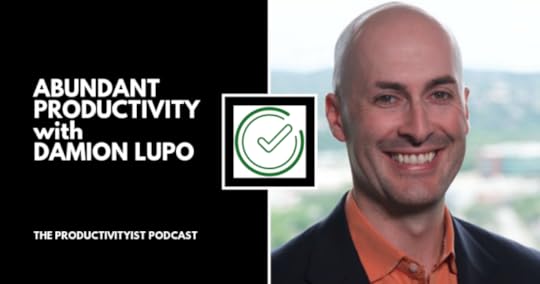
On this episode of the podcast, I am joined by Damion Lupo, a financial mentor and co-author of Reinvented Life. Wherever you are right now, I think this discussion will offer you some helpful advice and practical tips you can use today.
Some of the takeaways from our conversation include:
The importance of triggers
The questions to ask to find blind spots
How frameworks and structure foster creativity
Why we have a need for stillness and simplicity
Relevant Links:
Total Financial Control
Reinvented Life by Damion Lupo
Damion Lupo’s Website | DamionLupo.com
Damion Lupo | Twitter
Read the transcript for this episode
Download the PDF transcript for this episode
Thanks for tuning in! Until next time, remember to stop guessing…and start going.
If you’re interested in supporting the podcast and receiving exclusive content while doing so, you’ll want to check out the patrons-only version of The Productivityist Podcast on Patreon. Also, remember to leave The Productivityist Podcast a rating and review on iTunes, or on whatever platform you’re listening to. I read every single bit of feedback we receive. I want to make this show better and with your help I can do that.
The post Abundant Productivity with Damion Lupo appeared first on Productivityist.
June 22, 2017
5 Productivity Tricks For A More Productive Day of Summer Travel
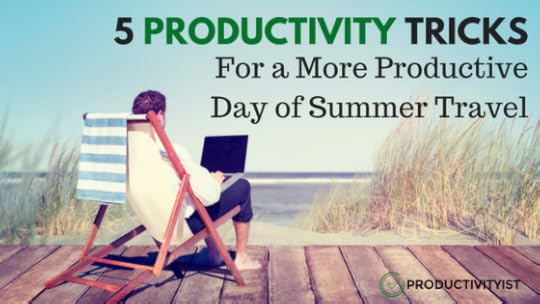
Today’s guest post is by Kacey Mya. Kacey is a lifestyle blogger for “The Drifter Collective.” She finds excitement in the world around her and this is portrayed through her visually pleasing, culturally embracing and inspiring posts. You can connect with Kacey on Twitter, Pinterest or Instagram.
There’s nothing better than a nice vacation. And, while it’s lovely to see and experience places you’ve never been, one of the best things about getting away is, well, getting away.
The stress-relieving qualities of vacation are well documented. The Mind Body Center at the University of Pittsburgh discovered through a study that participants who took a vacation suffered from fewer bouts of depression than those who did not take a vacation. They also experienced higher emotional levels than their non-vacationing counterparts. On top of that, vacationing improves your creativity and productivity when you get back to real life, too.
Now, all you have to do is make sure that the process of planning and enjoying said vacation comes without stress, too. There are so many steps you can take to make your next trip the most stress-free experience you’ve ever had on the go. Here are xx tips for making it that way.
1. Plan Ahead
Planning your trip ahead of time will remove so much of the stress that comes with travel. Clearly, you’ll make transportation and lodging plans well in advance. But, if you figure out a general idea of what you want to do each day you’re away, you’ll eliminate a lot of worry from your vacationing mind.
In order to get ahead of the curve, start a to-do list for your pre-vacation tasks, as well as the planning steps you need to take to prep your vacation activities, dining, etc. You don’t have to schedule your getaway down to the minute, but removing as many what-ifs as possible will have you walking into your vacation in a vacation state of mind.
2. Make Time to Relax
As you’re planning your trip, make sure you work in some time for you to simply relax. For everyone, the idea of a relaxing activity is different. Figure out what helps you de-stress and work that into your itinerary: whether it’s hiking, massage therapy or simply sunbathing on the beach, give yourself the chance to relax. You could also try something for the first time, such as yoga, while you’re away — you’ll de-stress and perhaps pick up a new hobby to bring back home with you.
3. Prioritize Health — Even on Vacation
Even though it’s tempting to move away from your healthy routines— and you should definitely indulge while you’re away — don’t completely sabotage yourself. That might mean sticking to your regular workout routine or maintaining a healthy diet that you adhere to while at home. You’ll be happy you stayed somewhat diligent when you easily fall back into your routine when you get back to real life.
To that end, it’s important to take time for yourself to rest and recharge if your trip will incur some level of jetlag. Even though you want to maximize your time abroad, powering through days of extreme tiredness will only strip the fun out of your vacation. Fix your sleep schedule and recharge before you leave home.
4. Disconnect from Work
How are you supposed to relax if your phone is buzzing with work e-mails, calls and reminders of impending deadlines? You need to make sure your vacation is exactly that — a break from the stress that everyday life brings. Unplugging from your phone and computer is a vital step in that process. The opportunity to truly unplug will incur some preparative steps, but the reward is a complete break from the grind. (And, if you must check your e-mail, make sure to limit yourself so that it’s not spoiling your leisure time.)
5. Give Yourself a Gap Day
Lastly, consider giving yourself a gap day after your vacation. This is a great way to ensure that you’ll return to work without stress. If you return straight from your vacation and restart work the next day, you won’t find yourself feeling rested. Instead, you’ll be wishing you had time to re-stock the fridge, wash your clothes, put away the suitcases and simply relax before returning to real life.
You don’t have to take off additional days to achieve your gap day. Just plan ahead so you return home on a Saturday. Then you have all day Sunday to get your life back in working order. By the time Monday rolls around, you’ll be ready and recharged for the workweek.
The post 5 Productivity Tricks For A More Productive Day of Summer Travel appeared first on Productivityist.
June 19, 2017
Sleep Smarter with Shawn Stevenson
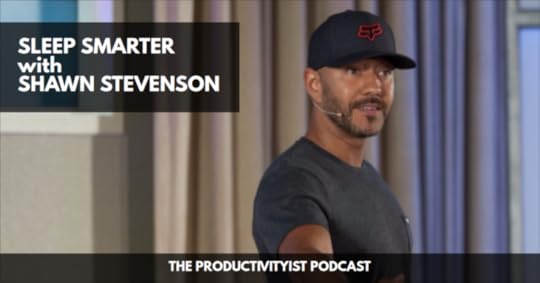
I met Shawn Stevenson at Tropical Think Tank in February of 2017 and his talk was phenomenal. We had a few exchanges while we were there but I wanted to have him on the show to dive deeper into some of his work.
Shawn is the author Sleep Smarter: 21 Essential Strategies to Sleep Your Way to a Better Body, Better Health, and Bigger Success and if you’ve been listening to my show for a while you know that I’m definitely into the idea of how sleep can affect your personal productivity.
Some of the highlights from our conversation include:
Why sleep is such a hot topic these days and what goes on during sleep that has such an impact on us
The controversy that surrounds some of the newer research surrounding sleep (and health in general)
Why getting sun and daylight on your skin is one of the most important things you can do – and why it’s harmful if you’re not taking time to do it
I had a great time speaking with Shawn on this episode. I hope you enjoy it as well.
LINKS
Sleep Smarter by Shawn Stevenson
The Power of When with Dr. Michael Breus | The Productivityist Podcast
The Model Health Show
Shawn Stevenson | Twitter
Shawn Stevenson | Instagram
Thanks for tuning in! Until next time, remember to stop guessing…and start going!
If you’re interested in supporting the podcast and receiving exclusive content while doing so, you’ll want to check out the patrons-only version of The Productivityist Podcast on Patreon. Also, remember to leave The Productivityist Podcast a rating and review on iTunes, or on whatever platform you’re listening to. I read every single bit of feedback we receive. I want to make this show better and with your help I can do that.
The post Sleep Smarter with Shawn Stevenson appeared first on Productivityist.
June 16, 2017
3 Places You Can Look At To Make Forward Progress Faster (and Better)
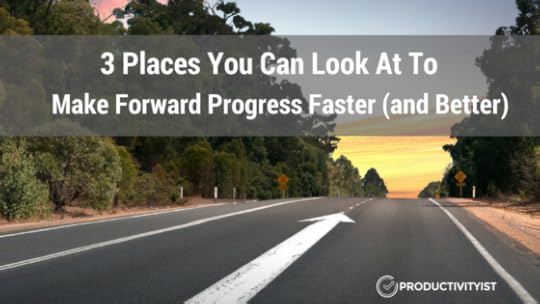
The City of Victoria recently added a dedicated bike lane on one of its streets. I’m not talking about a simple dividing line, either. They put in medians to separate the lane from motor vehicle traffic and several other features to make these new lanes (and altered infrastructure) as noticeable as possible.
I hadn’t driven this route since the construction began, so all I got to see was the “before and after.” I knew the construction was going on but only noticed the intricacies of the changes by looking as I drove along the corridor.
Noticing only occurs when you look around. Otherwise you’re relying on the observations and accounts of others.
In my experience there are three specific places to look at in order to look around in a way that allows you to make forward progress faster… and better.
1. Look Beyond Today
One of the biggest things you can do to make forward progress faster and better is to plan beyond the current day. If you aren’t already planning tomorrow before the end of today, you should. Leaving the current day’s planning to the “day of” puts you at risk of having an incomplete plan for the day, or worse, having “the day run you.”
2. Look to Yesterday
There is definite value in looking at what led up to this moment, especially when it comes to your productivity. You don’t need to dwell on it, but having information from your past can help you make better informed decisions for your future. One of the best ways to give yourself this history to review is to journal regularly – perhaps even daily like I do.
3. Look Elsewhere
You don’t have all the answers and you certainly don’t always have the best perspective to look at things objectively. That’s why reading older books can be such a huge help for you and your productivity. But looking elsewhere for advice and tactics on how to move forward with your intentions is a good idea. Like looking to yesterday, you want to make sure you do this in moderation; otherwise you can wind up falling victim to “paralysis by analysis.”
If you want to make forward progress with as little friction as possible – not unlike the motorists and cyclists in Victoria – you need to look around.
And now you know where to start.
The post 3 Places You Can Look At To Make Forward Progress Faster (and Better) appeared first on Productivityist.
June 12, 2017
Tackling Transition with Shawn Razek
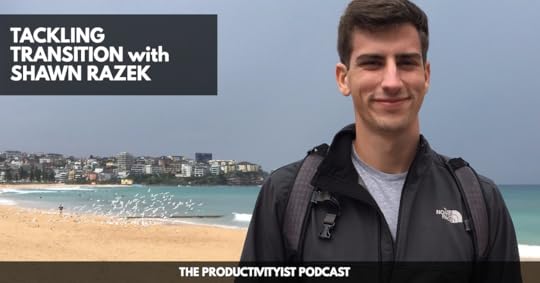
On this episode of the podcast, I am joined by engineer by day, aspiring productivity hacker, and co-founder of to-do list app Vista List, Shawn Razek.
Here’s the crux of Shawn’s mission: “Time is something we are all trying to make the most of and I want to do my part to help others accomplish that through coaching and creating great tools.”
Some of the takeaways from our conversation include:
The transition from high school to college (and then to the workforce) is often a big change.
Working longer can be a sign that you’re not being productive at work. Small 3-minute and 4-minute tasks add up during the course of a day.
Shawn does a short workout every day during his lunch hour. Establish your precedents and boundaries with co-workers.
We often overestimate the amount of time left for projects and tasks.
Relevant Links
Vista List
Vista List (@Vista_List) | Twitter
Shawn Razek | Medium
Shawn Razek | LinkedIn
Read the transcript for this episode
Download the PDF transcript for this episode
Thanks for tuning in! Until next time, remember to stop guessing…and start going.
If you’re interested in supporting the podcast and receiving exclusive content while doing so, you’ll want to check out the patrons-only version of The Productivityist Podcast on Patreon. Also, remember to leave The Productivityist Podcast a rating and review on iTunes, or on whatever platform you’re listening to. I read every single bit of feedback we receive. I want to make this show better and with your help I can do that.
The post Tackling Transition with Shawn Razek appeared first on Productivityist.
June 8, 2017
One Word To Change How You View Productivity
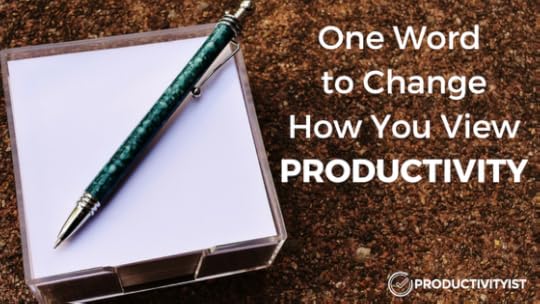
Today’s guest post is from Johan D’Haeseleer. Johan is a writer, speaker, and the founder of Extra Time. Johan’s passion is helping people make the most of their time and reduce their stress levels.
Productivity can get confusing at times, right? But at its core, productivity is actually simple.
To be productive, you have to do the right things in the right way. And doing the right things is the key to being effective. When you do those right things in the right way, that’s how you’re efficient.
You want to do both of these things. While you may be effective checking your email inbox many times during the day, it’s not efficient.
I’d like to present to you a simple formula of sorts:
Personal Productivity = Output/Input
Your productivity depends on this simple equation. Your output is the work you do; the projects and tasks that you accomplish. When you do not finish a project, there is no output, so you are not productive.
On the other side, the more projects you deliver, the greater your output. And the fewer projects you have, the faster you can finish your work. The more output you’ll have.
One Word That Changes Everything
Now, let’s talk about input. Input is made up of your resources. What are your resources? You can think of the word TEAM.
T.E.A.M. is an acronym for time, energy, attention and money. These are by far the most valuable things you have. And each of these resources is limited. Once they are gone, they’re gone. So you want to be sure that you maximize each one and use them on what matters most to you. So how can you become more efficient (and effective) with these valuable resources?
Let’s look closer at each resource.
1. Time
While you can’t have more than 24 hours in a day, you can work smarter to maximize each one of those hours. One of the best strategies to give yourself more time is to eliminate things that are not worth your time or do not add value.
Here are a few strategies to gain extra time (in no particular order):
Say no to anything you are not excited about or do not consider to be essential.
Automate your work or processes.
Reuse some already existing work. For example, if you have a podcast, you can use the transcriptions to create other content. Have video content? You can take the audio from that to create a podcast or even an audio course.
Use the 80/20 rule to refocus where you spend your time.
Outsource work to others who can do a better job in less time.
Delegate work to your co-workers.
Systematize.
2. Energy
Physical energy is an important tool for knowledge workers. And it is often grossly underestimated. Giving yourself more physical energy will help your productivity immensely. Your physical energy is directly related to your mental energy (that you tap into all day long).
Strategies that can help:
Optimize your sleep. Knowing your chronotype is very helpful with this. I highly recommend you take this free test and learn more about your sleep chronotype.
Eat healthy foods that boost your energy.
Regular exercise. (If you’re on a treadmill, that’s a great time to watch the news or a television show.)
3. Attention
When you concentrate on one task, not only do you use less mental energy, but you also save time because tasks do not take as long to complete. I know, this isn’t easy at first. You’re probably used to multitasking right?
One way you can better focus your attention is to know more about how your brain works.
One of the best books I’ve ever read about this topic is Brain Rules. I recommend you put it on your reading list.
A few more strategies to focus your attention include:
Make fewer decisions throughout your day.
Spend time in meditation.
Try using the Pomodoro technique as it can help you focus on one task.
Mindful multitasking such as listening to an audiobook on your commute.
Reduce the number of distractions.
Reduce the number of interruptions.
4. Money
Money is something we all use every day. We make it, and we spend it. Once it’s gone, it’s gone. Money can be one of the most important resources you have. However, whenever given the option, I find it best to use any extra money for extra time.
What do I mean? Having someone do my yard work for me which allows me to spend more time with my family.
Here are a few other ways you can make the most of your money:
YNAB (You Need A Budget) is a helpful way to track your money.
Calculate the ROI (Return on Investment) for the activities you’re doing. Just figure out the time required for a task and how much money your time is worth. This is a great way to figure out if a task should be outsourced or not.
Invest in good bookkeeping/accounting software if needed (especially for business owners). You’ll save both money and stress in the long run.
Next Steps
Focus on one of these four resources and think about how you can maximize that area of your life. In many cases, time is a good place to start. When you have more free time (I like to call this extra time), you can then use that time to maximize your energy, attention or money.
I’d like to help you on this journey by giving you my Productivity Toolkit which includes a short ebook, a closer look at the concept of TEAM and also The 10 Commandments of Productivity. Each tool will help you maximize your time, energy, attention, and money.
Do you have any tips for how you maximize your time, energy, attention, or money? Please share in the comments.
The post One Word To Change How You View Productivity appeared first on Productivityist.
June 5, 2017
Real Artists Don’t Starve with Jeff Goins
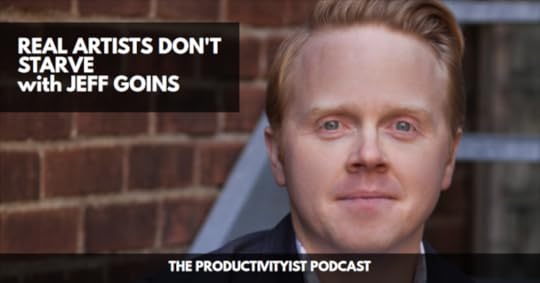
Jeff Goins is out to prove that real artists don’t have to starve. In fact, he is out to prove that they can thrive in his latest book Real Artists Don’t Starve: Timeless Strategies for Thriving in the New Creative Age.
My wife and I had the chance to spend time with Jeff at Tropical Think Tank in early 2017 and we had some fantastic conversations surrounding artistry, writing, business, family, and more. While I’ve hung out with Jeff at other events (including Chris Guillebeau’s World Domination Summit), getting to know him better in Cebu was one of the highlights of my time there.
Some of the things we discussed in this episode include the idea of how he he is able to be so prolific and deliver quality at the same time, why stealing can be something an artist can do, why collaboration can be a good thing – or even the best thing – for the thriving artist, what role mindset and money have in the life of an artist, and more.
Relevant Links
Real Artists Don’t Starve | DontStarve.com
Jeff Goins’s Website | GoinsWriter.com
Why You Need to Take Personal Productivity Personally | Productivityist
@JeffGoins | Twitter
Thanks for tuning in! Until next time, remember to stop guessing…and start going.
If you’re interested in supporting the podcast and receiving exclusive content while doing so, you’ll want to check out the patrons-only version of The Productivityist Podcast on Patreon. Also, remember to leave The Productivityist Podcast a rating and review on iTunes, or on whatever platform you’re listening to. I read every single bit of feedback we receive. I want to make this show better and with your help I can do that.
The post Real Artists Don’t Starve with Jeff Goins appeared first on Productivityist.
June 1, 2017
What I Learned from “Dining” with David Sedaris

Recently, I stood in line for well over an hour to speak with David Sedaris.
He had just finished doing a reading from his forthcoming book. My friend Terri and I decided we wanted to get our books signed before we called it a night. David was gracious with the lengthy lineup as he stuck around for over two hours to sign books and chat with everyone who approached him at the signing table.
When it was my turn, he asked me if I wanted a piece of his cornbread. He had been eating a late dinner during the signing session and had a piece of the yellow bread left.
“Sure,” I said. I took it and ate it quickly. He was quick to ask me a follow-up question as he flipped through pages of the book I’d given him to sign – the one containing my favorite essay of his, Laugh, Kookaburra – so he could find the appropriate page to leave his mark.
“What do you do?”
“I’m a writer,” I remarked. I didn’t want to be one of those writers that comes up to a successful author and declares that I am a writer, so I was glad he broached the subject.
“What do you write about?”
“Time management and productivity.”
By this time, he was looking directly at me, making absolutely no additional progress on the signing of the book.
“You know, the internet can be an interesting thing. It’s got distractions and…”
He started to dive a bit deeper into how the internet can hamper productivity. I didn’t expect him to go down this path at all. I thought he’d simply sign my book and move on to the next person. We were actually starting to have a discussion about writing. I found myself talking with David Sedaris – a writer I’ve admired for a long time – about writing.
We talked about how we can’t really read anything when we are working on a big writing project and how I was facing that right now with my latest work. I told him that his work was the kind of “bridge writing” I like to read between reading non-fiction and fiction. We spoke of changing up our environments and the cliché of occasionally writing in coffee shops rather than our home offices.
Then we wrapped up our chat – one that was all of about three minutes long but seemed far longer. He signed the book I gave him – my favorite of his to date, adding the phrase YOU FEASTED ON MY CORNBREAD to the page for good measure. We said goodbye. I moved along, and the line behind me moved forward.
I’ve been moving forward as well since that encounter.
I’ve been working on stuff for The Productivityist Playbook. I’ve been mapping out my new Daily Themes for the weeks and months ahead to be sure I leverage my time and energy better. (As always, you can read about what I’m doing now – including what my current Daily Themes are – here.
I wasn’t planning on attending David Sedaris’s reading while he was in town; I figured I had too much to do. I had a YouTube channel to dust off. I had some writing to do and other things on my plate.
But I wanted to go, so I did. I’m glad I did. Sometimes the things you want to do wind up being the things you needed to do. It doesn’t happen all the time, but when it does (and you go for it), you’ll find yourself farther ahead than you would have if you did something else.
And you might even get offered some cornbread by a New York Times bestselling author in the process.
The post What I Learned from “Dining” with David Sedaris appeared first on Productivityist.



